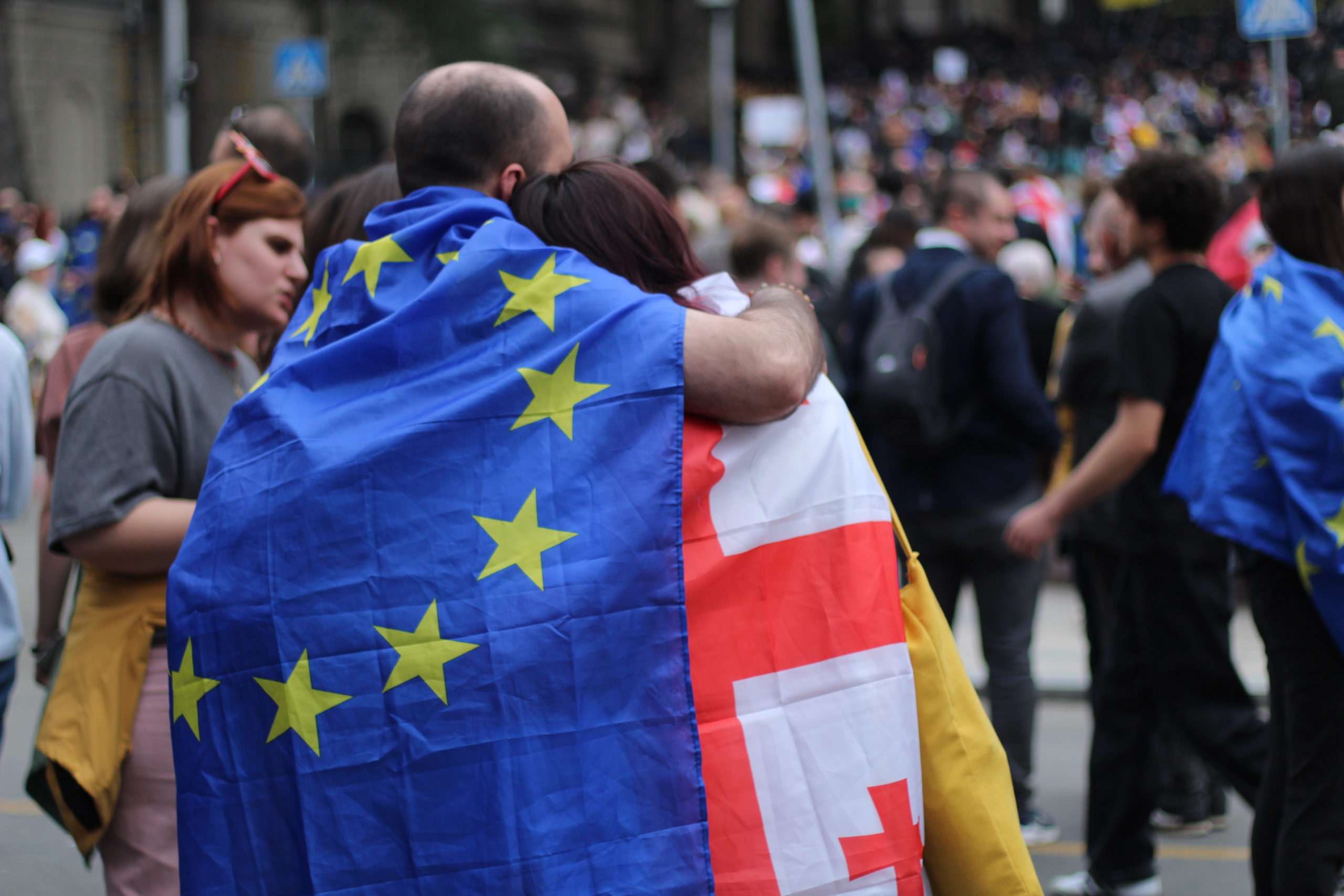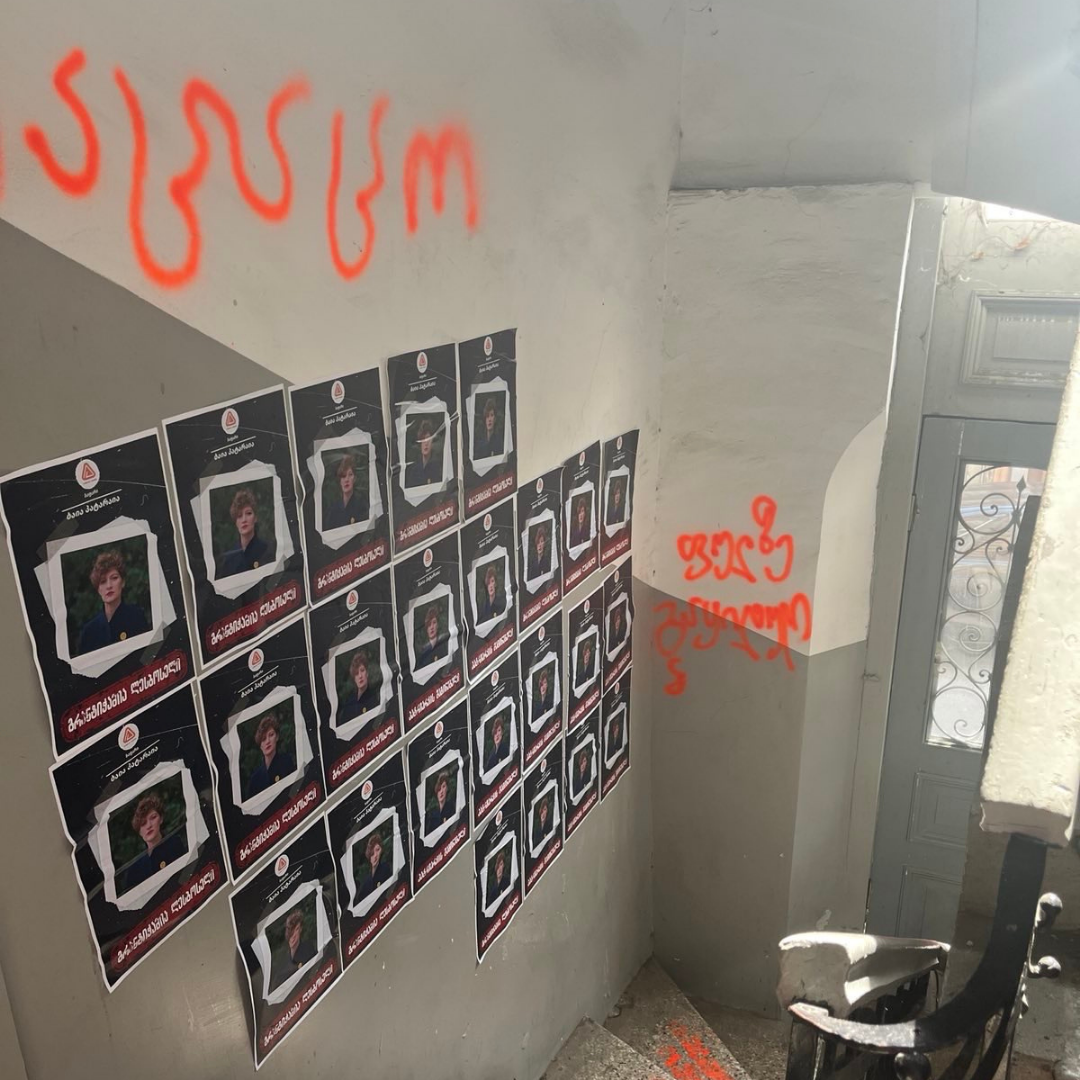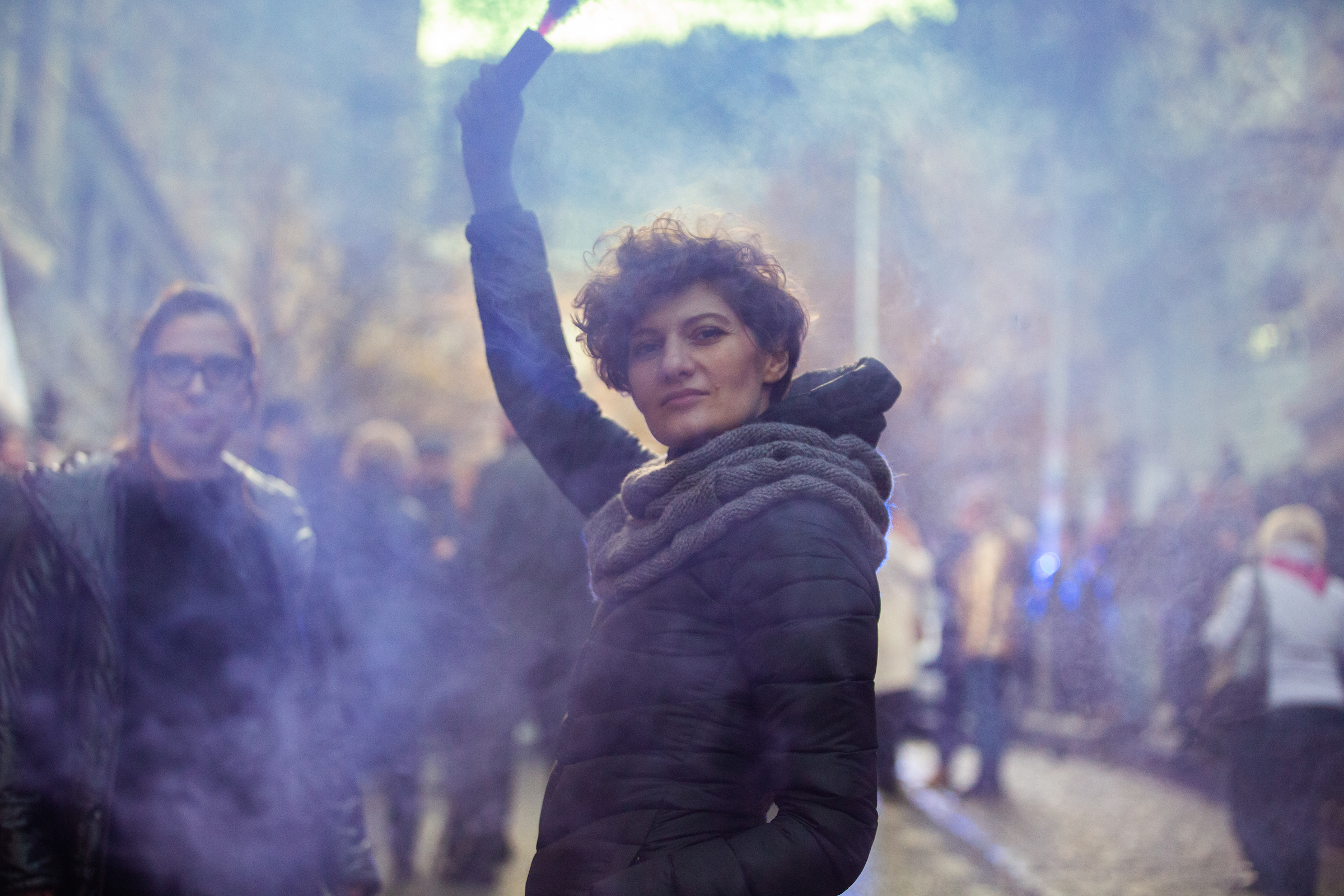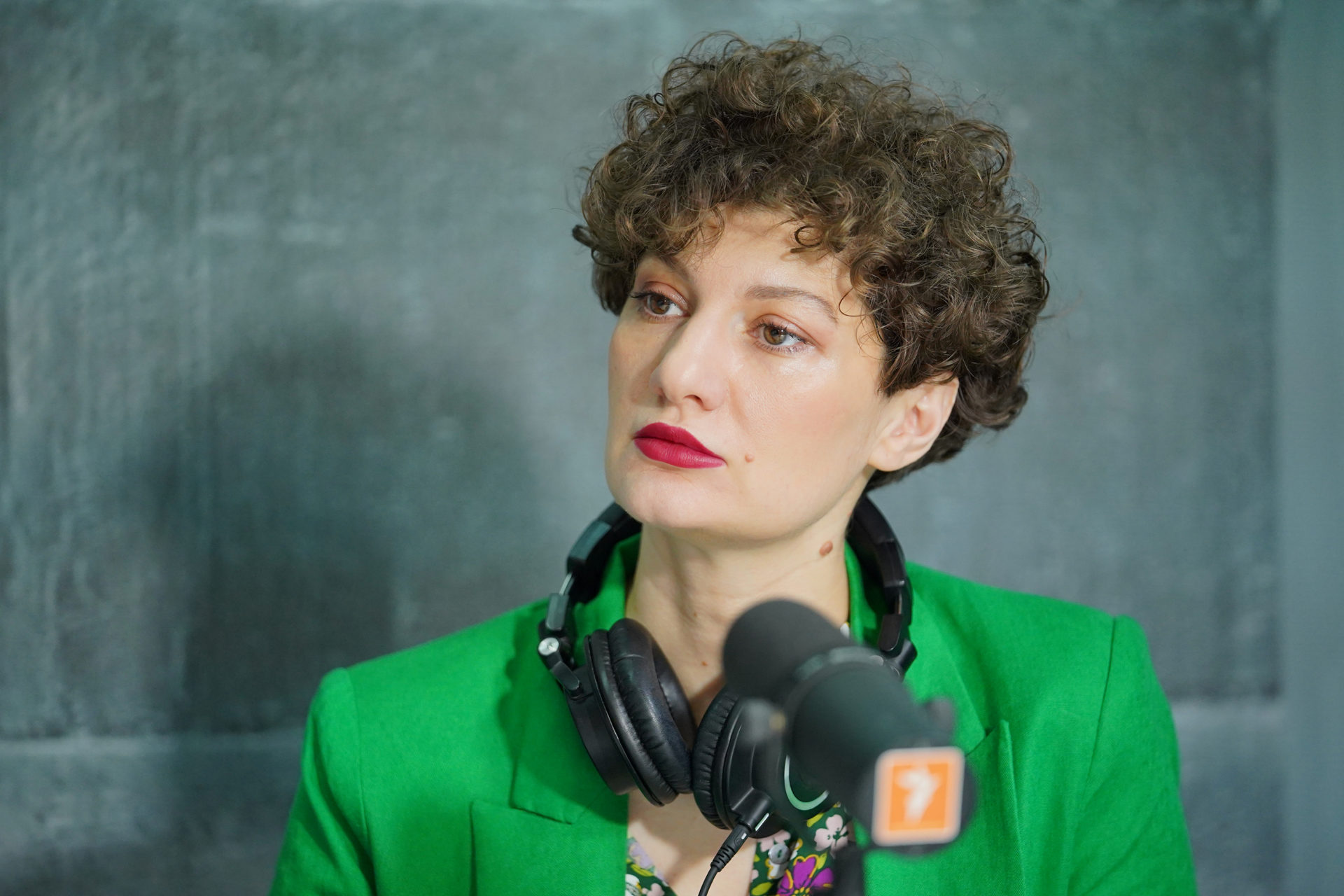What does this law mean for civil society and how will it impact human rights defenders and ordinary people in the country?
‘Foreign agent’ legislation has only one aim – to marginalise and shut down all critical voices within the country.
The government’s propaganda is very strong in Georgia. They use the most popular TV stations and spend a lot of money on advertising and boosting social media pages. What they are doing is to portray the “foreign agent” legislation as not how it really is.
The government lies, that this legislation is just about funding transparency. They say that because the funding comes from foreign countries, the non-governmental organisations (NGOs) are agents of “foreign influence”.
The most prominent NGOs will refuse to be registered because they don’t want to falsely admit that they are agents of “foreign influence” because they are not. We believe that we work for the Georgian people and protect the interests of only our country.
If nothing changes, and if this legislation stays in force for a longer period of time, critical organisations in Georgia will just disappear
Organisations will be shut down, heavy, heavy fines will be used against them. There will be also forced registration even if you don’t agree to register.
It’s not a problem for [Georgian] authorities to further amend the [foreign agent] law and make it more strict – closer to what Russia has now. In Russia, they started with a softer law and then became stricter.
Ordinary people who are affected by this propaganda think that everything will continue as normal, but this is a lie – it will not. This law will affect everyone.
Due to the propaganda not everyone understands that this law affects them. Not everyone realises the wider effects of the law like losing a variety of services and aid that people receive, the suspension of aid, which is directed to the development of infrastructure, education etc. Civil society works very hard on developing democracy, and benefits of the work of watchdog organisations sometimes is hard to see. Some think that they don’t benefit from aid, but they personally do. They benefit from projects that come with Western aid and are performed by civil society.
Unfortunately, it’s not easy to communicate these benefits to everyone, especially when there is a lot of disinformation and smear campaigns against civil society which have continued for years.
We see some of the Russian rhetoric such as “grant eaters”, but the Georgian government also invents new rhetoric about “rich NGOs” and blatantly lies about the property of the people leading the NGOs. The government tries to marginalise and make an enemy out of local NGOs. They want people to lose trust in civil society, to make it harder to assess the real value of civil society.
How will it affect women’s rights and equality and the fight against various forms of violence against women?
There are only a handful of women’s organisations in Georgia but they offer various legal, psychological and social services for victims of violence & discrimination.
Those who benefit are mostly women who cannot hire a lawyer on their own or need support like informational support or societal support that NGOs try to build around them.
A lot of initiatives and informal initiatives are supported by these organisations that will be affected by the “foreign agent” legislation as well. Those that help women to succeed in many ways – specific education, information, employment, political participation, and economic participation. There are so many projects working to empower women.
These possibilities for women will not be available anymore. Because of [“foreign agent”] legislation, women will directly be affected by a lack of these services.
In addition, NGOs performed a lot of advocacy and lobbying successfully. If no one is advocating for equality and women’s rights, there will be a slideback. Civil society has been important to change legislation but also to change implementation in practice, and the attitudes of the people.
If that work stops, the damage will be huge. [Simply achieving progress] is never enough for women’s rights, you have to constantly work to safeguard rights [that have been won]. For instance, mandatory gender quotas were abolished in exactly three days at the beginning of April, while it took a decade to adopt them.
How have the Georgian authorities reached this point? What has been the situation of HRDs and civil society in recent years?
The situation has drastically deteriorated following the start of Russia’s full-scale invasion of Ukraine. There might be different reasons for that, but it really coincides. On the other hand, since then, some positive processes have been put in motion such as Ukraine, Moldova and Georgia receiving EU candidate status. So the situation has been complex.
Events in Georgia following Russia’s invasion of Ukraine have also really triggered our oligarch Bidzina Ivanishvili who earned his money initially in Russia, lived in Russia and in reality is a Russian oligarch. He has now state-captured Georgia. Of course, he was legally elected at first, but now after three terms – 12 years, he is becoming a fully-fledged autocrat.
And so when [Russia began its full-scale invasion of Ukraine], and there was this opportunity for EU integration, Georgia was lagging behind. Huge peaceful protests were started by civil society to push the government to follow the path of EU integration. I think this is the point when Ivanishvili decided that he had to completely get rid of civil society.
Ivanishvili saw that civil society is capable of mobilising people and creating pressure internally and internationally. He saw that civil society is no less of a danger to him than the political opposition.
On 29 April 2024, Georgian Dream [Georgia’s current ruling political party established in 2012 by Ivanishvili] conducted a counter-demonstration to the peaceful protests organised by civil society. Here they brought in people from all the regions by buses including civil servants, teachers and other people financially dependent on the government – of course they had their activists too.
There Ivanishvilli held a speech where he openly claimed responsibility for the “foreign agent” law and said that by tabling the laws now, we are forcing NGOs to expend the energy which they were planning to use during the elections. Now, they are spending it uselessly in the streets. The “agentura” will be weakened, it will be exhausted before the elections.
How has the Georgian civil society pushed against this law up until its adoption and what will you do now? Is it still possible to defeat this law?
We have the constitutional court – it is not an independent body unfortunately, the majority are appointed by Georgian Dream. So, we do not have much hope for the court unless Georgian Dream tells them to suspend the legislation or to find the legislation unconstitutional, but I do not think that they will do that, especially before the elections, because they want to show strength. They cannot take steps back despite pressure from the public or from internationals – they see this as a strength of the party and they want to demonstrate it.
When [the authorities] start coming after each of us [civil society], when we start receiving fines or forceful registrations or things like that, then we will apply to the European Court of Human Rights.
But this will take a lot of time, and won’t be effective enough, and by that time I think some major organisations will already be abolished.
Our only hope is the upcoming 26 October elections. If the opposition wins then the [“foreign agent”] law will be abolished. If they lose, then the direction that Georgian Dream takes us in will only become harsher and harsher.
The elections in October are not normal elections – we see it as almost a referendum between Russification and EU-integration. This is the choice for Georgia.

The problem is that if the government attacks election observation missions and NGOs, and the elections will be held without proper monitoring the entire outcome will be questionable. Free and fair elections mean that any eligible and interested person should be allowed to observe.
It’s very important that we communicate the significance of these elections to the public. Voter mobilisation is crucial because we know already that there is massive vote buying from Georgian Dream – anyone who has a salary from the state will be forced to vote for Georgian Dream and they will be forced to be involved in campaigning. The government promises to abolish student loans… they will subsidise a lot of things… of course, these promises will accelerate as October approaches.
We will survive and operate until these elections, but if Georgian Dream wins then we will no longer be able to work as NGOs.
What can the international community do to help Georgian civil society?
International society has been very supportive so far and they could play an important role in upcoming months. Sanctions from the United States are very significant. It would be perfect if the EU could do something, even visa bans on individuals are very effective, no one wants to be sanctioned individually; it is a huge moral and psychological pressure to be sanctioned. Besides Brussels, individual member states could also take steps on their own. Even if one country introduces visa bans against those adopting “foreign agent” legislation, or those behind violations against peaceful protesters, this would help.
All the means that the international community uses against Russian oligarchs – they must use these means against Ivanishvili – because that is exactly what he is – a Russian oligarch. And now when he has captured the entire state, he is taking Georgia from EU’s orbit to Russia’s orbit.
Over the last few months, we have seen a crackdown against peaceful protests, the spread of disinformation, threatening phone calls, vandalising of homes and offices and smear campaigns against human rights defenders including you. How has this affected you and your colleagues?
We still continue to work but… My elderly parents are receiving threatening calls now. My 16-year-old son is receiving calls, my sister, my ex-husband – and this is the case for many.
We [civil society] are more or less equipped to deal with these calls, but now [the authorities] terrorise our families and society, to scare everyone away. They want to stop people supporting the cause. They want to stop people participating in peaceful protests.
They are vandalising our offices, our homes. They even wrote my name on the walls with swear words – they broke into my building, wrote “foreign agent” and “sold on money” on the walls next to my apartment. As of now, up to 20 people – activists and demonstrators – have been beaten close to their houses at different times.

The authorities make lists of who should be beaten – one MP openly said that they would take revenge and punish… The speaker of the Georgian parliament wrote a post about an activist on social media, and that activist was beaten within an hour of the post going online.
The police do not react, there are no investigations even though people have filmed the violators and faces can be clearly seen, none of them are detained. At the same time, the authorities identify everyone participating in peaceful protests and fine them. The fines in total will soon reach GEL 1 million [approx EUR 330 000]. People cannot pay these big fines.
Georgian civil society has done fundraising and has collected up to half a million [GEL] and we are paying those fines. None of the donors want to pay these fines. It’s very difficult to fundraise in Georgia, but maybe in foreign countries it could be possible.
And, of course, it is having an effect.
Protests are not happening right now, and when they do happen, now fewer people show up, although I believe in September and October the protests will revive.
I do not expect this situation to improve any time soon. On the contrary, I think there will be more and more attacks, including on political activists and oppositional party members.
All of these attacks are backed by the government. On the other hand, the opposition party has very limited resources. If you are a businessperson expressing support for the opposition party, you will have a state auditor and a prosecutor at your door the next day.
Independent media outlets also have huge financial problems – artificial problems created by the government, and the [“foreign agent”] law affects them too. Lots of media outlets are treated like NGOs according to this legislation.
What impact do you expect these developments to have on countries in the region?
If Georgia doesn’t choose the pro-European path, then there is no chance left for Armenia. For Georgia and Armenia, this legislation is a real threat. It affects the whole neighbourhood and the balance of power.
“Foreign agent” legislation is exported from Russia to every country where it is appearing now.
We see that these countries are all under the influence of Russia – at least their current governments are. This legislation weakens democracy and increases the power of the authoritarians.
Every country should be very vigilant, as this legislation has popped up in many places.
Where democratic countries are adopting, let’s say ‘less harmful’ versions of it… it might not be as bad as what is happening in our country, but it is a threat wherever it is implemented. It presents too much risk and it gives strong argumentation to authoritarian countries – they are able to say “if you have such legislation, then why can’t we?”
Implementation is the key here. In democratic countries, this legislation is not implemented against NGOs and civil society, but that is exactly what is happening in authoritarian countries.
Democratic countries need to find a different way to manage Russian influence. They must not adopt similar legislation. It’s completely unbelievable that Brussels is adopting similar legislation and telling others not to adopt it.
FARA is a problematic piece of legislation in the United States, but the difference is that because of the independent judiciary, and because the US is a country where judges and courts decide a lot, FARA works in a way that is more or less ok. But in authoritarian countries where the institutions are not independent and not strong, legislation like this is a complete disaster.
The EU, NATO and our Western partners should see this situation as very dangerous. Here, timing is the key. We still have a chance to overcome this situation, but in six months… a year, it will be too late. Whatever our partners are willing to do, they need to do it now. I am concerned that the urgency and timing is not properly understood by our Western partners, although the US is doing better.
Do you have any final thoughts?
The importance of timing right now cannot be understated. We need support NOW. Not in six months, one year… five years. Georgian civil society needs support NOW.
[Georgian civil society] still has the strength to fight – we are fighting- but everyone should understand that this is not an equal fight. [The authorities] have the police, special forces, huge financial resources, while we have very limited resources.
For whom diplomacy and words are very important, Europeans make the mistake of thinking that Russian oligarchs are the same. This is not true. These people only understand the language of violence and force.
Georgian Dream does not understand business language, they do not understand diplomatic language. This is the nature of authoritarian rule and we have seen this with Putin. Ivanishvili is a mini version of a dictator.
I fear that Europe is missing the chance with Georgia and that they don’t understand the momentum. And what they are doing is not enough.
Ivanishvili has French citizenship and can travel everywhere. What if he couldn’t?
Georgian Dream can travel wherever they want. What if they couldn’t?
They must feel discomfort and restrictions. This would be a real step.

Baia Pataraia, a lawyer and one of Georgia’s most prominent human rights defenders. She is the director of Sapari, an NGO focused on women’s rights and supporting domestic violence victims. She previously chaired the board of Human Rights House Tbilisi, of which Sapari is a member organisation. Additionally, Pataraia founded the Georgian Women’s Movement, a social initiative group comprising thousands of women activists.
Prior to working at Sapari, Pataraia worked for four years at the international law department in the ministry of justice of Georgia.
Read more about Pataraia and her work in our 2019 interview “We had to create a movement”.





